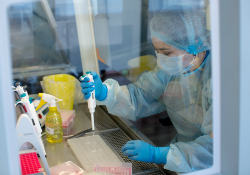Better labs as a bridge to a stronger health system in Kyrgyzstan

WHO/Mihail Grigorev
High-functioning laboratories are essential for improving health care and public health in Kyrgyzstan. For example, accurate laboratory results help to identify patients at risk of cardiovascular diseases, which cause 1 in 2 deaths in the country. Laboratory testing for sensitivity to anti-tuberculosis drugs enables the selection of appropriate treatment for patients with multidrug-resistant tuberculosis (MDR-TB), another high-burden disease in Kyrgyzstan. Laboratories also play a crucial role in detecting and controlling infectious diseases and preventing outbreaks.
Kyrgyzstan, despite having a large number of operating laboratories, lacks a laboratory certification system. This leads to low-quality services and unreliable test results. The country also lacks qualified laboratory personnel, and many laboratories use outdated equipment produced as early as the 1960s.
In 2015, Kyrgyzstan began to implement the WHO Better Labs for Better Health initiative. Under this initiative, WHO leads and coordinates the efforts of national health authorities, donors and development partners to build national laboratory capacity on different levels. This involves developing relevant policies; introducing and implementing national and international quality standards; strengthening laboratory services; and training laboratory specialists.
As a first step, Kyrgyzstan carried out a situational analysis on laboratory services in the country. Based on the findings, the Ministry of Health produced a national policy, a strategic plan and a programme for the development of the national laboratory service until 2025.
Over the past 3 years, health authorities have been establishing national standards for laboratory certification and a quality management system for laboratory research. To prepare the national laboratories for accreditation in accordance with the international standard ISO 15189, Kyrgyzstan introduced a mentoring programme for laboratories. Addressing the need for human resource development, it also evaluated and updated the national training curriculum for laboratory personnel. In 2017, Kyrgyzstan started work on creating a single approach and system for transporting samples.
This comprehensive and coordinated approach makes it possible for Kyrgyzstan to optimally spend limited resources and gradually improve laboratory services, with the overarching goal of strengthening the country’s health system and public health. These efforts have already proven effective: for example, between 2013 and 2018, the number of laboratories accredited in accordance with international standards grew from 11 to 25. The recently introduced HIV testing guidelines and new diagnostic technique for TB and MDR-TB have also significantly reduced the time needed to detect the diseases, ensuring early treatment initiation as well as reduction and control of further transmission.



